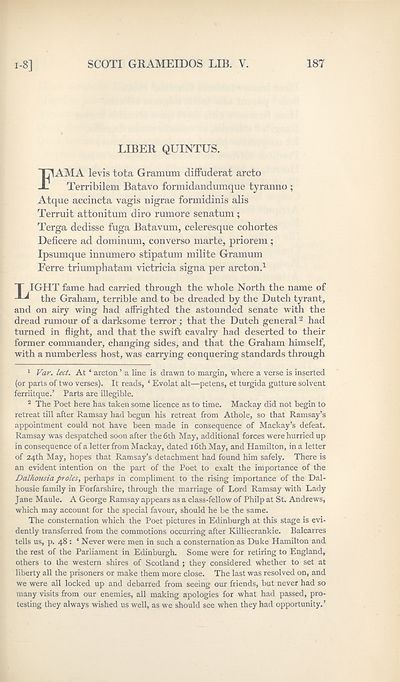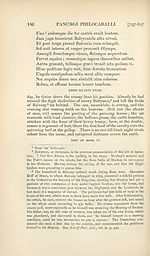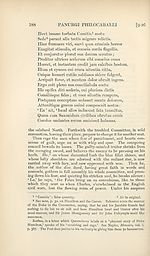Series 1 > Grameid: an heroic poem descriptive of the campaign of Viscount Dundee in 1689, and other pieces
(258) Page 187
Download files
Complete book:
Individual page:
Thumbnail gallery: Grid view | List view

1-8]
SCOTI GRAMEIDOS LIB. V.
187
LIBER QUINTUS.
FAMA levis tota Gramum difFuderat arcto
Terribilem Batavo formidandumque tyranno ;
Atque accincta vagis nigrae formidinis alis
Terruit attonitum diro rumore senatum ;
Terga dedisse fuga Batavum, celeresque cohortes
Deficere ad dominum, converso marte, priorem;
Ipsumque innumero stipatum milite Gramum
Ferre triumphatam victricia signa per arcton.1
T IGHT fame had carried through the whole North the name of
the Graham, terrible and to be dreaded by the Dutch tyrant,
and on airy wing had affrighted the astounded senate with the
dread rumour of a darksome terror ; that the Dutch general2 had
turned in flight, and that the swift cavalry had deserted to their
former commander, changing sides, and that the Graham himself,
with a numberless host, was carrying conquering standards through
1 Var. led. At ‘ arcton ’ a line is drawn to margin, where a verse is inserted
(or parts of two verses). It reads, ‘ Evolat alt—petens, et turgida gutture solvent
ferriitque.’ Parts are illegible.
2 The Poet here has taken some licence as to time. Mackay did not begin to
retreat till after Ramsay had begun his retreat from Athole, so that Ramsay’s
appointment could not have been made in consequence of Mackay’s defeat.
Ramsay was despatched soon after the 6th May, additional forces were hurried up
in consequence of a letter from Mackay, dated l6th May, and Hamilton, in a letter
of 24th May, hopes that Ramsay’s detachment had found him safely. There is
an evident intention on the part of the Poet to exalt the importance of the
Dalhousia proles, perhaps in compliment to the rising importance of the Dal-
housie family in Forfarshire, through the marriage of Lord Ramsay with Lady
Jane Maule. A George Ramsay appears as a class-fellow of Philp at St. Andrews,
which may account for the special favour, should he be the same.
The consternation which the Poet pictures in Edinburgh at this stage is evi¬
dently transferred from the commotions occurring after Killiecrankie. Balcarres
tells us, p. 48 : ‘ Never were men in such a consternation as Duke Hamilton and
the rest of the Parliament in Edinburgh. Some were for retiring to England,
others to the western shires of Scotland ; they considered whether to set at
liberty all the prisoners or make them more close. The last was resolved on, and
we were all locked up and debarred from seeing our friends, but never had so
many visits from our enemies, all making apologies for what had passed, pro¬
testing they always wished us well, as we should see when they had opportunity.’
SCOTI GRAMEIDOS LIB. V.
187
LIBER QUINTUS.
FAMA levis tota Gramum difFuderat arcto
Terribilem Batavo formidandumque tyranno ;
Atque accincta vagis nigrae formidinis alis
Terruit attonitum diro rumore senatum ;
Terga dedisse fuga Batavum, celeresque cohortes
Deficere ad dominum, converso marte, priorem;
Ipsumque innumero stipatum milite Gramum
Ferre triumphatam victricia signa per arcton.1
T IGHT fame had carried through the whole North the name of
the Graham, terrible and to be dreaded by the Dutch tyrant,
and on airy wing had affrighted the astounded senate with the
dread rumour of a darksome terror ; that the Dutch general2 had
turned in flight, and that the swift cavalry had deserted to their
former commander, changing sides, and that the Graham himself,
with a numberless host, was carrying conquering standards through
1 Var. led. At ‘ arcton ’ a line is drawn to margin, where a verse is inserted
(or parts of two verses). It reads, ‘ Evolat alt—petens, et turgida gutture solvent
ferriitque.’ Parts are illegible.
2 The Poet here has taken some licence as to time. Mackay did not begin to
retreat till after Ramsay had begun his retreat from Athole, so that Ramsay’s
appointment could not have been made in consequence of Mackay’s defeat.
Ramsay was despatched soon after the 6th May, additional forces were hurried up
in consequence of a letter from Mackay, dated l6th May, and Hamilton, in a letter
of 24th May, hopes that Ramsay’s detachment had found him safely. There is
an evident intention on the part of the Poet to exalt the importance of the
Dalhousia proles, perhaps in compliment to the rising importance of the Dal-
housie family in Forfarshire, through the marriage of Lord Ramsay with Lady
Jane Maule. A George Ramsay appears as a class-fellow of Philp at St. Andrews,
which may account for the special favour, should he be the same.
The consternation which the Poet pictures in Edinburgh at this stage is evi¬
dently transferred from the commotions occurring after Killiecrankie. Balcarres
tells us, p. 48 : ‘ Never were men in such a consternation as Duke Hamilton and
the rest of the Parliament in Edinburgh. Some were for retiring to England,
others to the western shires of Scotland ; they considered whether to set at
liberty all the prisoners or make them more close. The last was resolved on, and
we were all locked up and debarred from seeing our friends, but never had so
many visits from our enemies, all making apologies for what had passed, pro¬
testing they always wished us well, as we should see when they had opportunity.’
Set display mode to:
![]() Universal Viewer |
Universal Viewer | ![]() Mirador |
Large image | Transcription
Mirador |
Large image | Transcription
Images and transcriptions on this page, including medium image downloads, may be used under the Creative Commons Attribution 4.0 International Licence unless otherwise stated. ![]()
| Scottish History Society volumes > Series 1 > Grameid: an heroic poem descriptive of the campaign of Viscount Dundee in 1689, and other pieces > (258) Page 187 |
|---|
| Permanent URL | https://digital.nls.uk/126598653 |
|---|
| Attribution and copyright: |
|
|---|
| Description | Over 180 volumes, published by the Scottish History Society, containing original sources on Scotland's history and people. With a wide range of subjects, the books collectively cover all periods from the 12th to 20th centuries, and reflect changing trends in Scottish history. Sources are accompanied by scholarly interpretation, references and bibliographies. Volumes are usually published annually, and more digitised volumes will be added as they become available. |
|---|


